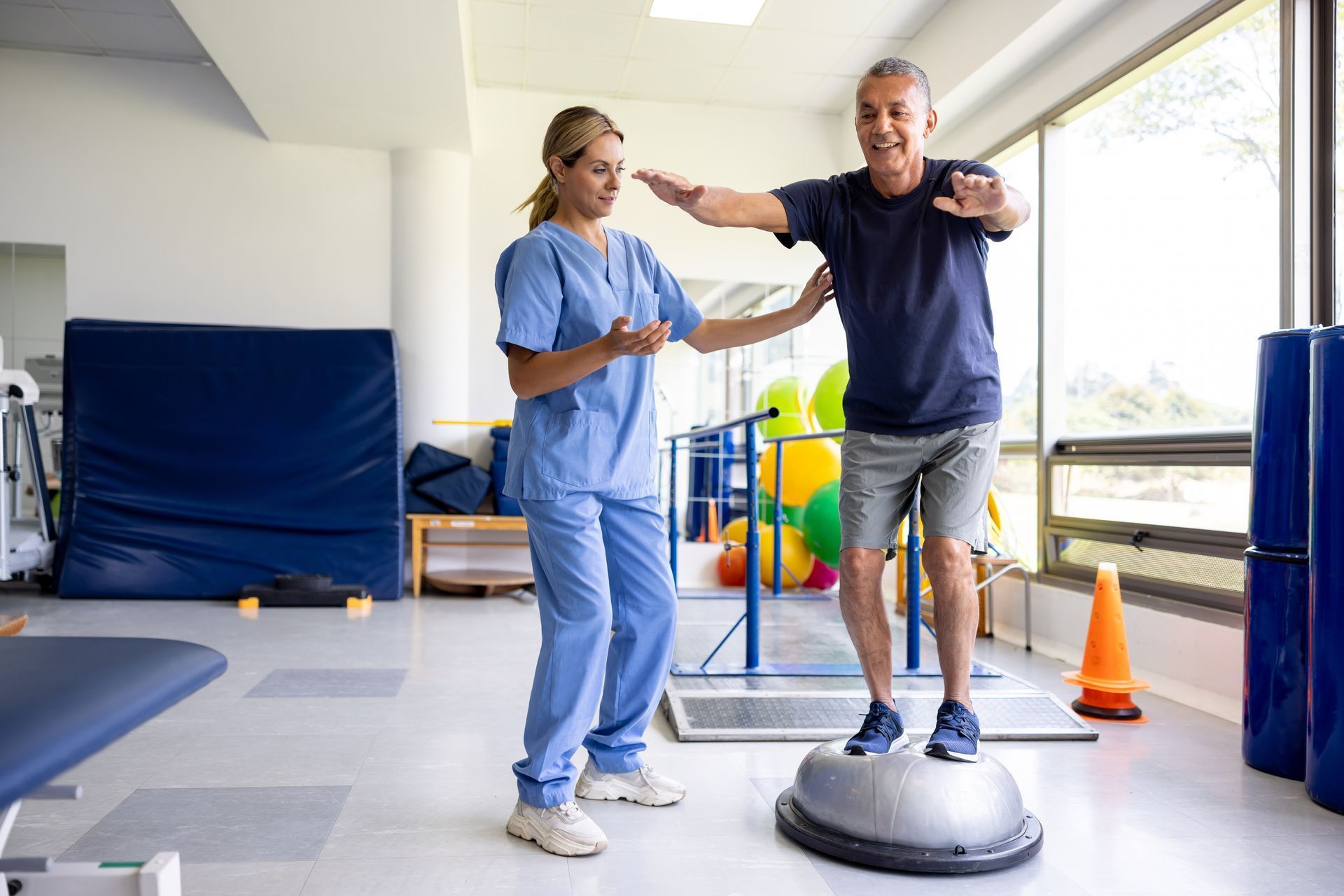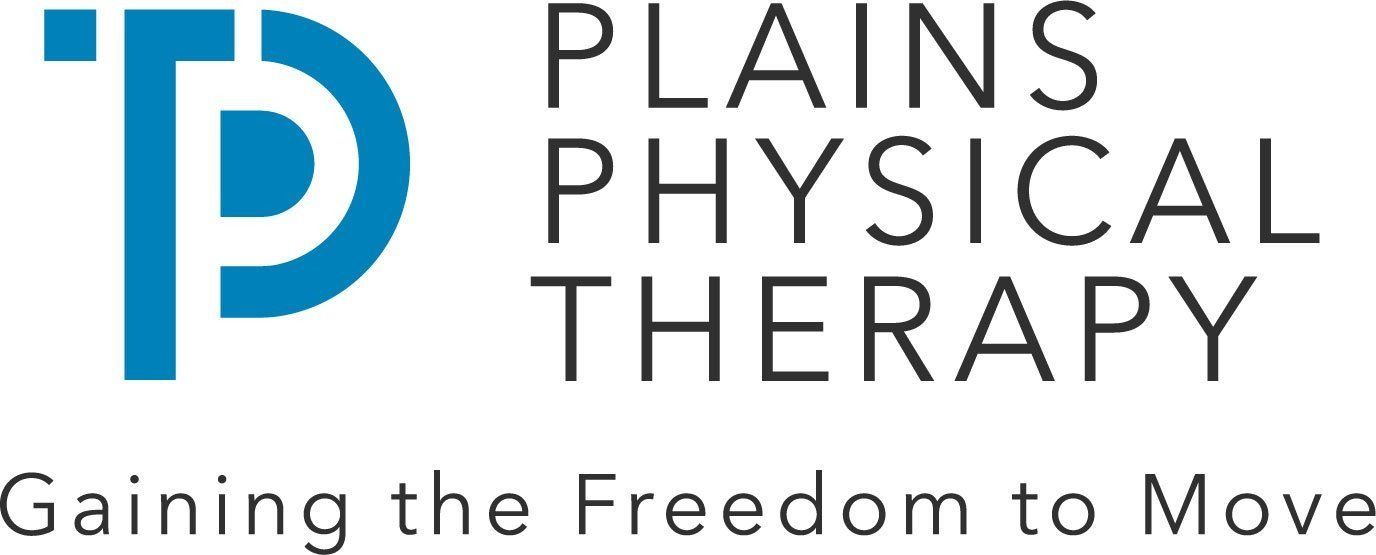May 24, 2024
Finding Balance Dizziness and Physical Therapy
Finding Balance Dizziness and Physical Therapy
Dizziness is common in people over 20, and it can be a big problem in daily life. Feeling unsteady, lightheaded, or like the room is spinning is alarming and makes daily tasks difficult. The good news is that dizziness often has treatable causes, and your physical therapist can be the perfect person to help.
Understanding Dizziness
Dizziness isn't a specific problem—it's a symptom that can be caused by many different issues. Feeling dizzy most commonly occurs due to issues with the inner ear, but it can also occur due to vision, joint or muscle issues in the neck, migraines, changes in blood pressure, head injuries, or other neurological problems.How Physical Therapists Help
To understand dizziness and how a PT can help, you must know a little about how balance works. Your brain uses information from your inner ears, your vision, and input from your joints about their position and movement to keep you balanced and stable. Typically, all of this information paints the same picture for your brain. If your brain gets conflicting information – say, your inner ear sends different information than vision and your joints - that often results in a feeling of dizziness, unsteadiness, or vertigo. Your physical therapist will ask questions about your history and then test all of the systems that help you stay balanced to determine the cause of your dizziness. Your treatment plan will vary depending on what your PT finds. Some typical examples include: ● Exercises: Your PT may prescribe specific exercises to improve your balance, strengthen or stretch specific muscles, or help retrain your brain to interpret sensory information. These can include gaze stabilization exercises, which help your eyes and inner ears work better together; habituation exercises, which help your brain get used to different types of input; and balance training on various surfaces. ● Canalith repositioning maneuvers (CRM): If your dizziness is caused by benign paroxysmal positional vertigo (BPPV), a specific type of inner ear problem, your therapist may perform maneuvers to reposition tiny crystals within your ear canal, alleviating your vertigo. They can also teach you how to do these at home. ● Education: Your therapist will educate you about your condition, how to manage dizziness, and exercises you can perform at home. They may also help you modify activities that cause dizziness or train you on ways to work through it. Dizziness doesn't have to interfere with life. Physical therapists can help reduce dizziness, improve balance, lower the risk of falls, and increase confidence in daily activities.References:
- Cervicogenic Dizziness: A Review of Diagnosis and Treatment
- https://www.jospt.org/doi/10.2519/jospt.2000.30.12.755
- Physical therapy interventions for older people with vertigo, dizziness and balance disorders addressing mobility and participation: a systematic review. BMC Geriatr 20, 494 (2020).
- https://doi.org/10.1186/s12877-020-01899-9
- Vestibular Rehabilitation for Peripheral Vestibular Hypofunction: An Evidence-Based Clinical Practice Guideline: FROM THE AMERICAN PHYSICAL THERAPY ASSOCIATION NEUROLOGY SECTION. J Neurol Phys Ther. 2016 Apr;40(2):124-55. doi: 10.1097/NPT.0000000000000120. PMID: 26913496; PMCID: PMC4795094
- 10.1097/NPT.0000000000000120
- Between Cognitive Assessment and Balance Measures in Adolescents Referred for Vestibular Physical Therapy After Concussion. Clin J Sport Med. 2016 Jan;26(1):46-52.
- https://www.ncbi.nlm.nih.gov/pmc/articles/PMC4856020/
- Physical Therapy lowers falls by 68% after Dizziness
- https://www.apta.org/article/2023/09/19/study-physical-therapy-after-dizziness-diagnosis-lowers-fall-risk-by-86
- Physical Therapy Guide to Dizziness
- https://www.choosept.com/guide/physical-therapy-guide-vertigo
- Vestibular Rehabilitation Therapy
- https://my.clevelandclinic.org/health/treatments/15298-vestibular-rehabilitation

September 14, 2025
Stay Steady: Tips for Fall Prevention Month September is Fall Prevention Month, and it’s the perfect time to shine a light on a serious but often overlooked issue. Every year, 1 in 4 adults over age 65 experiences a fall, and about 1 in 5 of those falls causes serious injuries like broken bones or head trauma. But here’s the good news: while falls are common, they are not an inevitable part of aging. With the right strategies—exercise, home safety changes, and professional support—you can stay steady, confident, and independent. Build Strength to Protect Yourself Your legs are your foundation for stability, but as we age, muscle naturally declines without resistance training. That weakness directly increases fall risk. The solution? Strengthen your lower body with activities like: Walking or hiking Water exercise (great for joints) Resistance bands or light weights Bodyweight moves like squats and lunges Stair climbing �55357;�56393; A physical therapist can design a safe, personalized program to target the exact muscles that keep you upright and steady. Balance Training: Use It or Lose It Balance isn’t just something you “have”—it’s a skill that can fade if you don’t challenge it. Practicing balance regularly can dramatically reduce fall risk. Try these simple exercises (with support nearby): Single-leg stands: hold 10–30 seconds per side Stand with eyes closed: 10–15 seconds Chair rises: stand up without using your hands Heel-to-toe walking: walk in a straight line ⚠️ Always practice near a counter or sturdy chair, and stop if you feel dizzy or unsafe. Make Your Home Safer Many falls happen right where you live. A few simple tweaks can make your home much safer: Add night lights in hallways and bathrooms Remove loose rugs and clutter Keep cords and cables out of walkways Install grab bars in bathrooms Store frequently used items within easy reach Don’t Forget Vision & Medications Your eyes and your prescriptions can play a big role in your stability. Schedule regular eye exams to catch vision changes. Ask your doctor or pharmacist to review medications—especially if you feel dizzy, drowsy, or unsteady. When to See a Physical Therapist If you’ve noticed unsteadiness, or if you’ve already had a fall, now’s the time to see a PT. We can: Assess your balance and strength Build a customized exercise program Teach fall-prevention strategies Partner with your doctor or pharmacist to address vision or medication issues The Bottom Line Falls are common, but they don’t have to define aging. By strengthening your legs, practicing balance, and creating a safer home environment, you can stay steady, active, and independent. This Fall Prevention Month, take one small step toward better balance—you’ll thank yourself later. �55357;�56525; Plains Physical Therapy is here to help. Call us today at 406-826-4383 to schedule a fall risk assessment and get a personalized plan to keep you safe and strong. Resources Exercise for falls and fracture prevention in long term care facilities: a systematic review and meta-analysis. J Am Med Dir Assoc. 2013;14(9):685-689.e2. a. https://pubmed.ncbi.nlm.nih.gov/23860265/ Preventing Falls in Older Persons. Am Fam Physician. 2017 Aug 15;96(4):240-247. PMID: 28925664. a. https://pubmed.ncbi.nlm.nih.gov/28925664/ The Effectiveness of Physical Therapist–Administered Group-Based Exercise on Fall Prevention: A Systematic Review of Randomized Controlled Trials. Journal of Geriatric Physical Therapy 36(4):p 182-193, October/December 2013. a. https://journals.lww.com/jgpt/fulltext/2013/10000/the_effectiveness_of_physical.5.aspx?casa_token=r5fLfvxztA0AAAAA:9yaeibFmZiCeIZiQcSOVcbWkWpA_8spTG-bNT2UFa-D2Dc7tljHsv3VW5XfmnvIySLNwrJDd7aqnJTsfdHmRqK8 Exergame technology and interactive interventions for elderly fall prevention: A systematic literature review a. https://www.sciencedirect.com/science/article/abs/pii/S0003687016302265 Articles/Content: Physical Therapy Guide to Falls https://www.choosept.com/guide/physical-therapy-guide-falls Fall Prevention Starts with a Conversation https://www.ncoa.org/article/falls-prevention-conversation-guide-for-caregivers Balance and Falls https://www.apta.org/patient-care/public-health-population-care/balance-and-falls

April 7, 2025
Physical Therapists Offer Cutting-Edge Solutions to Workplace Discomfort and Injury Prevention Physical therapists are emerging as key players in workplace health, providing innovative ergonomic solutions that dramatically reduce workplace injuries and improve employee well-being across industries. Workplace-related pain and discomfort are increasingly recognized as significant challenges for employers and employees alike. PTs are now taking a proactive approach, designing comprehensive workplace wellness strategies that address everything from manufacturing floor dynamics to office ergonomics. The goal is to transform how businesses think about workplace health. Physical therapists no longer want to just treat injuries - they're working with businesses to prevent them by creating work environments that support human physiology. Key Workplace Wellness Strategies Include: Comprehensive workstation assessments Customized movement and flexibility programs Ergonomic equipment recommendations Posture and body mechanics training For desk-based workers, PTs are highlighting critical interventions to combat the health risks associated with prolonged sitting. Common issues like neck stiffness, lower back pain, and repetitive strain injuries can be significantly mitigated through targeted interventions. Employees can start today by: Taking frequent short breaks Performing in-chair stretches Optimizing workstation setup For employers, physical therapists recommend: Investing in ergonomic assessments Providing employee movement training Creating flexible work environments that prioritize physical health Businesses interested in reducing workplace injuries and improving employee productivity are encouraged to consult with a physical therapist who specializes in workplace ergonomics.

March 11, 2025
Spring Back into Motion: Preventing Overuse Injuries As flowers bloom and the days get longer, it's natural to want to get outside. Whether you're digging in your garden, hitting the trails, or playing sports, spring brings new energy. But if you were inactive this winter, your body might not be ready for a sudden burst of activity. What Are Overuse Injuries? Overuse injuries happen when we do too much, too soon, or too often. These aren't injuries from a fall or sudden twist. Instead, they build up slowly from repeating the same movements over and over. Common symptoms of overuse injuries include: ● Muscle soreness that doesn't go away ● Painful joints that ache when moving ● Tendons that feel tender to touch ● Swelling that doesn't go down Why Spring Can Be Risky After winter, many of us jump back into activities at full speed. Our bodies aren't prepared for this sudden change. Think about it: ● We've been less active during cold months ● Muscles might be weaker or tighter ● Our stamina isn't what it was last fall ● We're excited about the nicer weather and may do too much at once 5 Simple Ways to Prevent Injuries 1. Start Slow Begin with just 15-30 minutes of your activity. Add a little more time each week - 10% is a good guideline. Your body needs time to adjust! 2. Warm Up Right Never skip your warm up. Take 5-10 minutes to walk, do gentle stretching, and move your joints before any activity. 3. Mix It Up Don't do the same activity every day. Trying different things will let you use new muscle groups and give others rest. 3. Listen to Your Body Pain is a warning sign. If something hurts, stop and rest. A little muscle soreness is normal, but sharp pain isn't. 4. Use Good Tools and Form For gardening, use tools with padded handles and kneel instead of bending. For sports, make sure your gear fits well and learn proper form. Your Physical Therapist Can Help Your PT is your body's best friend when getting active again. We can: ● Check your movement patterns to spot problems before they cause pain ● Create a safe plan to build strength and flexibility ● Teach you specific exercises for your favorite activities ● Show you proper form to prevent strain ● Help you recover if you do get hurt Don't let an injury stop you from enjoying spring! With a little care and the right help, you can stay active and pain-free all season long. Call our office today to schedule a spring check-up - your body will thank you!

March 11, 2025
Your heart is your body's most important muscle, and like any muscle, it needs regular exercise to stay strong and healthy. This February, in honor of Heart Health Month, let’s explore how physical activity can boost your heart health—and how physical therapists can help. Why Movement Matters Every time you exercise, you're giving your heart a workout. Regular physical activity: ✔ Lowers blood pressure ✔ Reduces bad cholesterol ✔ Helps maintain a healthy weight Adults should aim for at least 150 minutes of moderate-intensity exercise per week to significantly lower their risk of heart disease, the leading cause of death worldwide. Getting Started Safely While exercise is essential for heart health, starting a new routine requires careful planning—especially if you: ✅ Have an existing heart condition ✅ Haven't exercised in a while ✅ Are recovering from heart surgery or a cardiac event ✅ Have other health conditions that affect mobility This is where physical therapists can help! How Physical Therapists Support Your Heart Health Physical therapists are movement experts who can: ✔ Assess your current fitness level and risk factors ✔ Create a personalized exercise plan tailored to your needs ✔ Teach proper exercise techniques to prevent injury ✔ Monitor progress and adjust your program as needed ✔ Provide guidance on heart-healthy lifestyle choices They work closely with your healthcare team to ensure your exercise plan is safe and effective—especially if you have a heart condition or are recovering from a cardiac event. Some physical therapists specialize further in cardiovascular and pulmonary rehabilitation, offering expertise in managing conditions such as: ✔ Chronic obstructive pulmonary disease (COPD) ✔ Breathing disorders ✔ Diabetes ✔ Vascular disease ✔ High blood pressure ✔ Heart disease and heart failure Simple Steps to Start Improving your heart health doesn’t require running marathons! Start with: ➡ Short walks in your neighborhood ➡ Gentle swimming or water exercises ➡ Light resistance training ➡ Stretching and flexibility exercises Remember: Any movement is better than no movement. Your physical therapist can help you find activities you enjoy and can maintain long-term. Get Started Today! Contact our physical therapy team to begin your journey toward better heart health with safe, guided physical activity. Let’s move together for a stronger, healthier heart!

December 15, 2024
The holiday season is a busy and exciting time of year but can also be stressful. Between shopping, parties, traveling, and visiting family, it's easy for your regular exercise routine to fall by the wayside. Research has shown that physical activity levels tend to decrease the most after holidays. That's why it's essential to prioritize your health this time of year. Regular exercise can help reduce holiday stress and keep you feeling your best. Here are some of the key benefits of maintaining your fitness routine: Stress Management The holidays bring a lot of added demands on your time and energy. Exercise is a proven way to manage stress and improve your mood. When you work out, your body releases endorphins that can lift your spirits and help you better cope with the season's pressures. Making time to be active, even just a little bit each day, can go a long way in keeping you calm and centered. Immune System Support Cold and flu season tends to ramp up during the winter months. Staying active can help support your immune system and reduce your risk of getting sick. Keeping up with your workouts makes you less susceptible to holiday illnesses that could derail your plans. Weight Management The holidays are full of rich, indulgent foods that can pack on extra pounds if you're not careful. Regular physical activity helps you maintain a healthy weight by burning calories and boosting your metabolism. It also gives you an outlet for all the extra energy you may have from eating more decadent foods. If you need help sticking to your exercise routine, consider talking to your physical therapist. They can create a customized fitness plan to help you stay on track, even with a busy holiday schedule. Physical therapists can teach you exercises you can do at home and provide tips for fitting activities into your day. Here are a few quick tips to help you stay active this holiday season: Schedule your workouts like any other important appointment, and don't cancel them. Find ways to be active with friends and family, like going for a walk after a meal. Keep home exercise equipment (like weights or a yoga mat) accessible and ready to use. Park further away from stores and buildings to get in extra steps. Don't let the hustle and bustle of the holidays derail your health and fitness goals. With a bit of planning and creativity, you can maintain your exercise routine and enjoy a happier, healthier holiday season.








